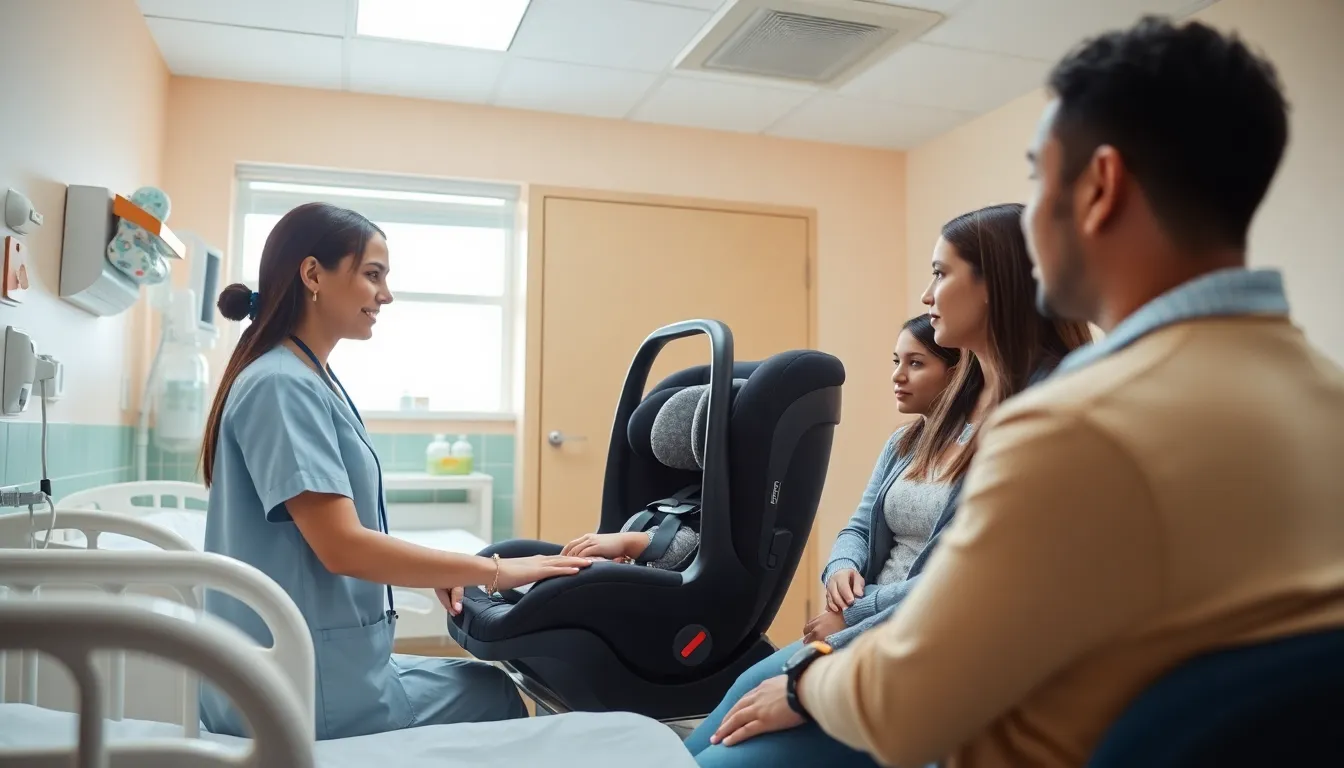Bringing home a newborn is like entering a thrilling adventure—one filled with joy, sleepless nights, and a whole lot of diaper changes. But before parents can embark on this wild ride, there’s the all-important hospital discharge process. It’s the moment when tiny humans officially transition from the cozy womb-like atmosphere of the hospital to the big, bright world outside.
Table of Contents
ToggleImportance Of Newborn Hospital Discharge
Newborn hospital discharge represents a critical milestone, marking the transition to home life. This process ensures the baby’s safe integration into the family environment.
Safety Considerations
Safety remains a priority during the discharge process. Hospital staff reviews car seat safety guidelines to ensure the newborn’s secure transport. Parents receive education on safe sleeping practices, such as placing the baby on their back in a crib free of soft bedding. Emergency contact numbers and pediatrician information get provided to guide parents in case of urgent situations. Preventing falls and securing hazardous materials in the home also forms part of the preparation. These measures collectively contribute to a safer environment for the newborn.
Health Assessments
Health assessments play a vital role in the discharge process. Pediatricians conduct thorough examinations to confirm the newborn’s overall well-being. Common evaluations include checking vital signs, monitoring weight, and assessing feeding patterns. Screening tests may identify potential health issues requiring follow-up care. Parents receive vital information related to vaccinations and upcoming check-up appointments to maintain the baby’s health. These assessments ensure that the newborn is ready for a healthy start at home.
Discharge Planning Process

The discharge planning process for newborns involves collaboration between healthcare professionals and parents, ensuring a smooth transition home. This plan addresses the baby’s immediate and long-term health needs.
Role Of Healthcare Professionals
Healthcare professionals play a crucial part in the discharge process. Pediatricians assess the newborn’s health by reviewing vital signs, weight, and feeding habits. Nurses provide guidance on car seat safety, demonstrating proper installation techniques. They also educate parents about safe sleep practices to mitigate risks such as SIDS. Additionally, healthcare teams deliver essential information about vaccinations and scheduling follow-up appointments. Each interaction aims to empower parents, equipping them with knowledge and confidence as they take their newborn home.
Parent Education
Parent education forms the foundation of a successful discharge process. Parents receive tailored resources about newborn care, focusing on feeding, bathing, and recognizing signs of illness. Instruction on how to secure the home against hazards reinforces safety. They learn to identify emergency situations and the importance of having contact details for pediatricians readily available. Workshops and printed materials enhance this education, ensuring parents understand the key aspects of infant care. Each component contributes to their confidence in nurturing their newborn successfully.
Common Assessments Before Discharge
Before leaving the hospital, healthcare professionals conduct several important assessments to ensure the newborn’s health and safety. These evaluations provide critical insights into the baby’s well-being.
Vital Signs Monitoring
Monitoring vital signs is essential for assessing a newborn’s health status. Nurses check the baby’s heart rate, respiratory rate, and temperature. These indicators help identify any potential health issues early. Consistent monitoring during the hospital stay ensures that any abnormalities prompt further evaluation. Parents receive guidance on what is considered normal and how to monitor these signs at home. This preparation supports a smoother transition from hospital to home.
Newborn Screening Tests
Newborn screening tests play a crucial role in early detection of disorders. These tests often include checks for metabolic conditions, genetic disorders, and hearing loss. Typically performed within the first few days of life, these assessments identify conditions that may not be apparent immediately. The results help healthcare providers develop necessary treatment plans. Parents receive information on the significance of these tests and follow-up actions if any issues arise. This proactive approach contributes to the infant’s long-term health and development.
Discharge Instructions For Parents
Parents receive essential instructions during the discharge process, ensuring they’re well-prepared for their newborn at home.
Feeding Guidelines
Breastfeeding provides vital nutrients, and parents are encouraged to feed on demand, typically 8 to 12 times per day. Formula feeding is another option, involving preparation according to the manufacturer’s guidelines. Parents should observe signs of hunger, such as rooting or sucking motions. It’s important to maintain a calm environment during feedings, promoting bonding and comfort. In addition, newborns may lose up to 10% of their birth weight in the first few days, so monitoring weight gain after initial loss is crucial. Pediatricians recommend follow-up visits to track growth and address any concerns about feeding patterns.
Signs Of Concern
Recognizing signs of concern is critical in monitoring the newborn’s health at home. Elevated temperature, specifically above 100.4°F (38°C), mandates immediate contact with a healthcare provider. Parents should also look out for signs of dehydration, including decreased urine output or a dry mouth. Unusual lethargy, excessive crying, or difficulty breathing should prompt an evaluation by a pediatrician. Skin color can indicate issues; jaundice, for example, appears as yellowing of the skin or eyes. Any concerns about feeding or behavior should not be ignored, ensuring swift action for the well-being of the infant.
Post-Discharge Follow-Up
Following discharge, monitoring the newborn’s health is crucial. Pediatricians typically schedule the first check-up within the first week postpartum. This appointment assesses weight, feeding patterns, and overall well-being. Parents receive valuable guidance on what to expect during this visit and beyond.
Healthcare providers emphasize the importance of reporting any health concerns early. Symptoms like fever, dehydration, unusual lethargy, or difficulty breathing require prompt attention. Parents should not hesitate to contact their pediatrician with any questions or uncertainties.
Regular vaccinations and screenings protect the newborn’s health. A vaccination schedule is established during the first visit, detailing when to administer crucial immunizations. Understanding this schedule helps parents comply with medical recommendations.
Parents also receive information on developmental milestones. Knowing expected progress during the first months assists in identifying any delays. Regular updates from the healthcare team keep parents informed and engaged.
Educational resources often accompany follow-up appointments. These materials cover topics like feeding, sleep safety, and recognizing signs of illness. Attendance at parenting classes can further enhance their knowledge and preparedness.
Home safety assessments may also be discussed during the follow-ups. Creating a safe environment for the newborn is a shared priority between parents and health professionals. Learning about baby-proofing strategies and emergency preparedness becomes essential in ensuring safety.
Lastly, ongoing support from healthcare providers fosters confidence. Regular communication encourages parents to feel secure in their ability to care for their newborn. This supportive partnership emphasizes the important role of healthcare providers in the newborn’s early life.
Bringing a newborn home is a significant milestone that requires careful preparation and attention. The discharge process is designed to ensure both the baby’s safety and the parents’ confidence as they embark on this new journey. With thorough health assessments and essential education on newborn care, parents are equipped to handle the challenges that come with caring for their little one.
Ongoing communication with healthcare providers remains vital as parents navigate the early stages of parenthood. By staying informed about health monitoring and developmental milestones, they can foster a nurturing environment that supports their baby’s growth and well-being. This collaborative approach lays the foundation for a healthy and happy start to family life.




